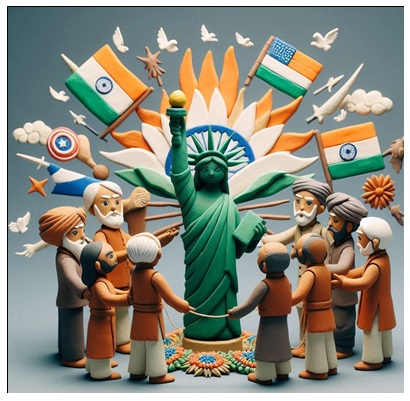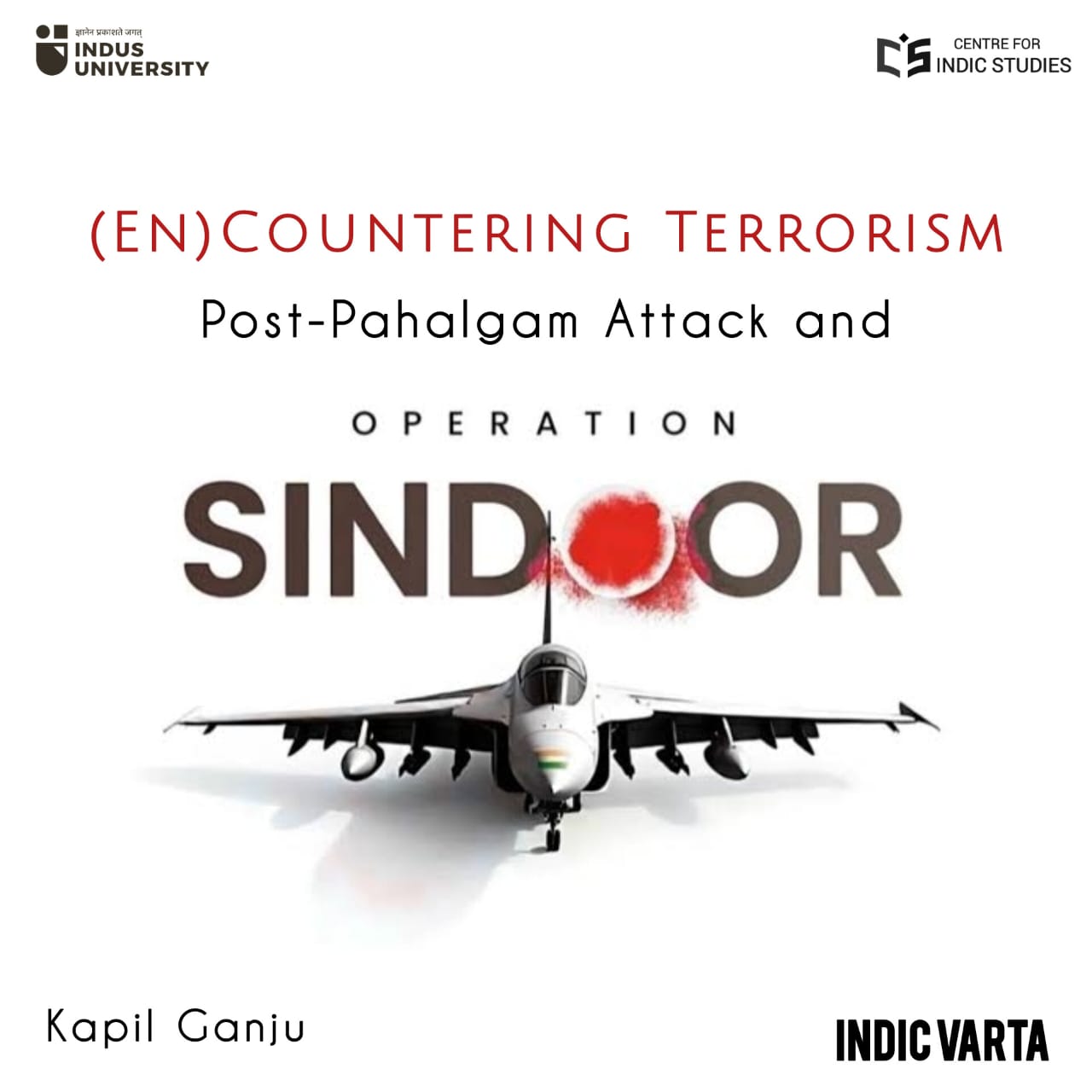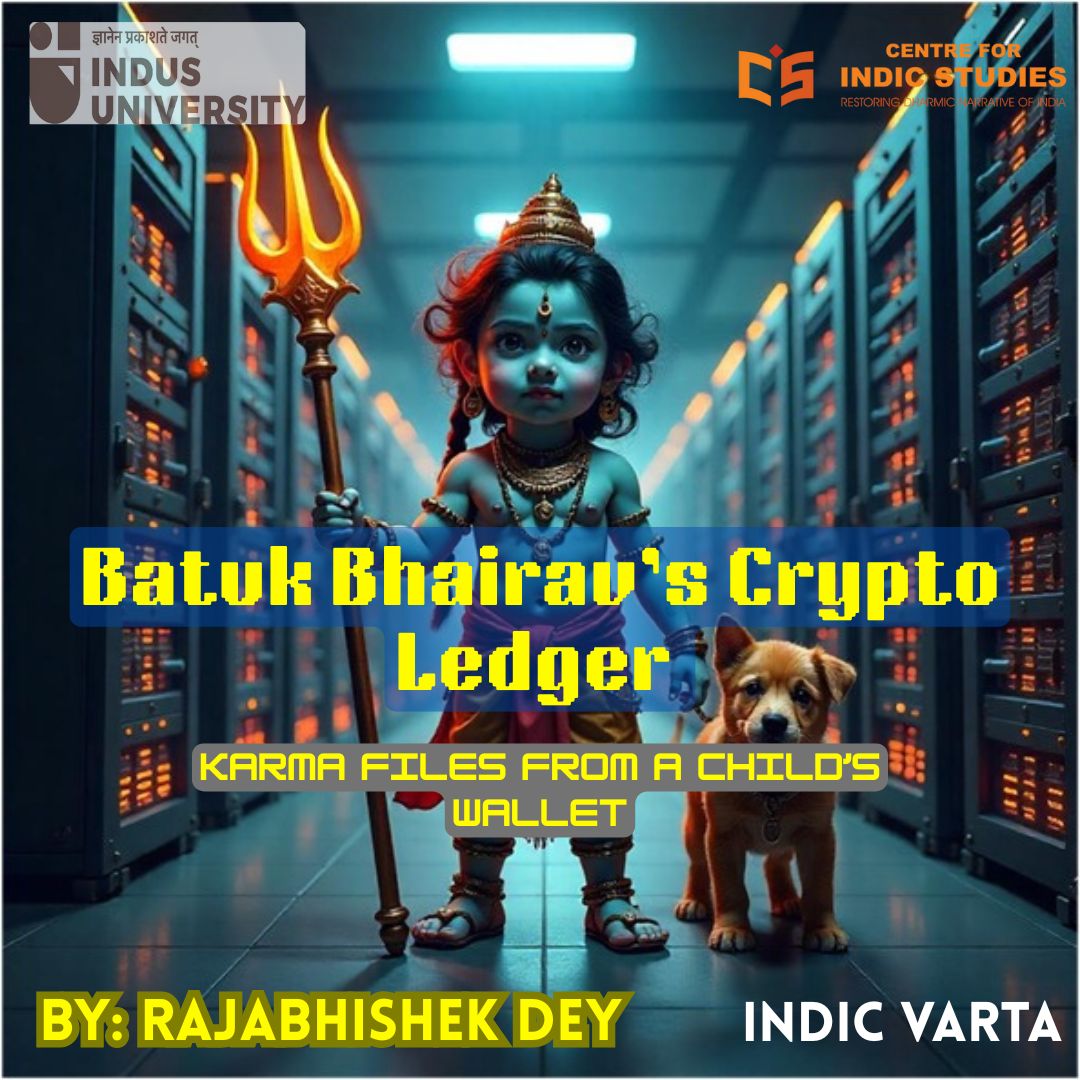- Visitor:193
- Published on: 2024-09-05 02:54 pm
Bharatiya Harmonization of Liberty, Equality and Fraternity

As discussed in the
first part of how Western civilization is unable to harmonize the core concepts
of ‘Liberty, Equality and Fraternity’. This part of the article treads into the
complex issue but with the Indic background. This essay will also discuss the
examples and the answers from Indic perspective. What are the things which make
it different and how, in different ways, Bharat is able to tackle the different
issue where West couldn’t?
Superficiality of
Western Thoughts
First comes the
superficiality of western society and its political philosophy. In the ‘grand’ construct
of cultural evolution of the West, Friedrich Nietzsche discerned a pivotal
conflict. He traced that the modern political philosophy is divergent to
ancient Greece or other civilizations which they have ended, where art and myth
held importance to teach society the necessary traits to be social animals. In
that epoch, creativity and morality had flourished, and myth wove the fabric of
morality, ethics and existence of the society. The yearning for the past to
return in the psyche of the west and also the criticism from Nietzsche is that modernity
has unfolded science as the dominant force overpowering facts and empirical
studies over other dynamics of the society. Can we harmonize science’s
empirical rigor with moral social beauty?
In this sense, Western
world has turned empirical and very crude, causing society to only believe in
the facts. The same is felt in the ideas of the West where philosophers are
trying their best to bring harmony but, created jargons and mansplaining over
it. The whole discussion and debate have far flexed to superficiality and are
getting over the head of the common people. This has been over-empowered
‘academicians’ from Harvard, Yale, Oxford and other institutions to generate
their utopian ideas over society without having the local understanding and
ground reality. This cut-off from the reality has caused western civilization transforming
reality into superficiality.
The terms liberty,
equality and fraternity along with justice have long gone when French raised
the trumpets and unleashed the voice actually against real social ills but in
superficial context and it failed when the same people cheered for
‘charismatic’ leadership of Napoleon when he showered wealth and against him
when he became autocratic supporter of the kings. So much confusion! French failed
to understand what the basis of the society they want should be! If it would
have been Bharat, for example, during the times of King Ven, when he became
autocratic and people suffered, they revolted, killed the king and then
stabilized the state based upon Dharma,
the core concept of Indic tradition.
The Extremities of
Noble Thoughts
In the evolution of
human thought, certain ideals do stand as pillars—noble, timeless, and universal.
Among these, liberty, equality, and fraternity have shaped societies,
revolutions, and the very essence of our existence. Yet, as you astutely
observe, there lies a paradox: the very virtues that elevate humanity can also
lead to excesses and unintended consequences. This we discussed in the first
part. Here, we need to understand that the West failed on two fronts.
First is to understand
the essence of those noble thoughts. The beginning of Western thought, rooted
in ancient Greece and Rome, laid the groundwork for these ideals. Philosophers
like Aristotle, Cicero, and Seneca grappled with questions of justice,
governance, and human flourishing. The Enlightenment era (17th to 18th
centuries) witnessed a renaissance of these ideas. Thinkers like John Locke,
Voltaire, and Rousseau championed liberty, reason, and social contract theory. The
American and French Revolutions crystallized these ideals into political
movements, shaping modern democracies. But,
this pursuit of absolute freedom lead to chaos. When liberty becomes license,
society fractures. English grammar exemplifies this: liberally bending rules
based upon individual right to use ‘pronouns’ based upon self-proposed gender
dysphoria. Second, striving for absolute equality stifled individuality and
meritocracy. The quest for uniformity overlooked diverse talents and
contributions. And, third, fraternity, when taken to extremes, fostered
tribalism. In-group solidarity may inadvertently exclude others, leading to
intolerance.
Actually, the noble
ideas thrive when tempered by wisdom and discernment. Also, it is important to
understand the ‘contextuality’. The application of these ideals must consider
cultural context, historical legacies, and evolving norms and there is a need
for Dynamic Equilibrium because society's progress lies in maintaining
equilibrium—where liberty, equality, and fraternity coexist harmoniously. The task
is not to discard these ideals or oppose them as also happening in the West, but
to refine and harmonize them– to recognize their limits and guard against their
excesses. Opposite to this ‘extremism’ is the basis of Dharma in the Indic perspective. In the tradition of thoughts in
Bharat, thoughts have been calibrated and harmonized in their contexts and
pretexts. Rishis and the thought
torchbearers understood the intermingling and the complexity of those thoughts.
They also not focused on specific thoughts but the conditions in which those
thought needed to be studied and applied.
The Managerial Elites
In the hallowed voices of academia,
where ideas are processed and given to the society, a subtle shift has occurred
in the West. A shift from roots to branches. The top-down approach, once a
ladder to enlightenment, now risks distancing scholars from the soil of lived
experience. The ‘Top-Down Paradigm’ is when the academia, with its ivory towers
and labyrinthine corridors, often gazes from lofty heights. The managerial
elites, ensconced in their cerebral citadels, wield influence. The theories have
been descended like celestial decrees and breed detachment. The pulse of
reality, the rhythm of everyday lives, have faded into abstraction. The West
faces a missing link. The intelligentsia, those torchbearers of thought, must
bridge the chasm. They are the weavers of narratives, the translators of
esoteric wisdom. Yet, the ‘jargonism’ have crept in. Words become veils,
obscuring rather than revealing. Concepts morph into cryptic glyphs. The
thoughts are far from the reality.
Opposite to this is
what Indic perspective has given to the world. The Rishis and the thoughts provider were themselves part of the
society. They followed ‘chaturvarnashram vyavastha’ and all other social
responsibilities. They live not in ivory towers but within the society
connected to the socio-political, economic and cultural part of the society.
The Dharma
Thus, we come to the
second distinguished feature where Bharat has a background of Dharma, more
than religion, morality and ethics, it is intuitively established
self-righteousness based upon the individual-social relationship. Bharat has
long paved the way to bring Dharma in our lives. It is not just the
philosophical mechanism but socio-political and economic mechanism of Indic
nature of state where it has been efforted to imbibe the concept of ‘inclusivity’ among Bharatiyas to live
practically on the Vedic echoes: “let noble thoughts come to us from all the
sides”. We have a constant continuity of Rishis,
monks, social reformers and guiding Gurus
who took efforts to imbibe dharma in us.
This idea of Dharma
distinguishes Bharat from the Western world. All the terms, real and
superficial, actually can be tested on Dharma.
For example, the political concept of liberty if tested upon the terms of Dharma would mean individual freedom but
also putting society before him. If his actions go beyond the social construct
and practices, his liberties can be tested on the terms of Dharma. For example, the arms act and the Hindu marriage system in
modern times, curtails the liberty to keep arms or to keep more than one wife.
It is evolving but this could only happen if the social construct is based upon
Dharma. The result, very less cases
of children going on shooting spree or the family structure of Bharat where
parents take care of children and less aborted or fractured families in Bharat.
Here, it is also important to discuss that, we aren’t perfect, no one is! But
the way towards perfection is often paved on the well-structured base which is
dharma and Inclusive nature!
There are other
examples as well. The present condition of India distorted because the society
(de)evolved through medieval dark and modern cunning ages. But, today too, any
reforms can be made upon the concept of Dharma,
the righteous path. Thus, it is necessary to understand that the triad,
liberty-equality and fraternity, is not treated separately in Bharat. Here, even
kings and monarchs are under the control of Dharma
and couldn’t live for self-pleasure. It has also helped to stop the cravings of
qualities of crude human being – the (dis)qualities of human in ‘state of
nature’.
The Liberty in the
Liberal Way of Life
The liberty of Bharatiya people is not on the basis of
superficial or natural social construct. But, everyone has a major role to play
in which he is in. The male and female have to work accordingly to the role
they have in the society. What does liberty mean then? Liberty is not unbounded
free will, but rationally bounded boundaries of self-control for the sake of
society. Liberty means individual being of the universal cosmos playing a major
part.
The Equality before
Dharma
At such crossroads of
how haves and have-nots will continue their living without disturbing the
balance, is through Dharma. There are
also many inbuilt practices that gave a broader area of liberty to individuals,
families and social institutions. First being, the form of democratic setup in
the society. This type of democracy is, not what Western civilization promotes,
but inclusive attitude that people have. The local social construct is democratic from the beginning in the form of
decentralization. This setup disabled to
interfere into the affairs of guilds, social constructs, panchayats or
local governance, private property and the way of worship of the people. They
could also not interfere in the knowledge system and scientific and
technological constructs. For example, no king or rich in Bharat named random
month of the year in his name. Yes! West does have Julius Caesar and Augustus!
This non-interference was followed only because of the belief in written texts
and the Vedic morality seeded into the way of life of the people— the equality
of everyone before Dharma. This has
been observed in the empathy among the people and the social understanding
among the society. Yet, it is also important to know that there had been wars,
quarrels and struggles among the society but for the Dharma to sustain. It is also important to criticize the failures
in Bharatiya civilization for taking it down to the level of Western culture. It
is what that makes Bharatiya civilization different. The knowledge is not only
theoretically based. It is important to understand that there are many imbibed practices
which are practical in nature, confirming the harmony between ‘Liberty,
Equality and Fraternity’. Some important practices include-- daana; daily practices of keeping food
aside for others; and varna system making
all to follow rules of society based upon scientific and psychological studies.
The concept of Gotra and Yagnya helps society to come together,
have philosophical and moral discussions and debates and learn from that. It
also allows to keep the ethos in continuity.
It is crucial to recognize that the
ongoing social evolution of Bharat transcends mere decades or centuries. It is
a profound and enduring endeavour. However, there have been deliberate efforts
to marginalize Indic perspectives. The side-lining and maligning on this Dharma,
which brings forth ‘inclusive ideas,’ poses a genuine threat to our
civilizational ethos. Western culture, in its emphasis on individualism over
communitarianism, prioritizes rights over duties and often favours artificial
constructs over realism. Their academic discourse sometimes devolves into what
I would term ‘Academic Polarity,’ where methodologies are shaped by social and
political agendas rather than objective inquiry. To engage with the West, we
must grapple with essential questions and critically examine western thought. To
engage with the West, we must critically examine prevailing Western paradigms.
Conclusion
The important take from the discussion can be many but one is that Western academia should come out of the artificial bubble of self-righteousness. But, we must also think about Indian academia at the same time. Indian academia should introspect and learn from the Indic wisdom and not blindly follow the West. Indic political thought must inculcate Indianization of the political science studies!
- 96 min read
- 3
- 0










